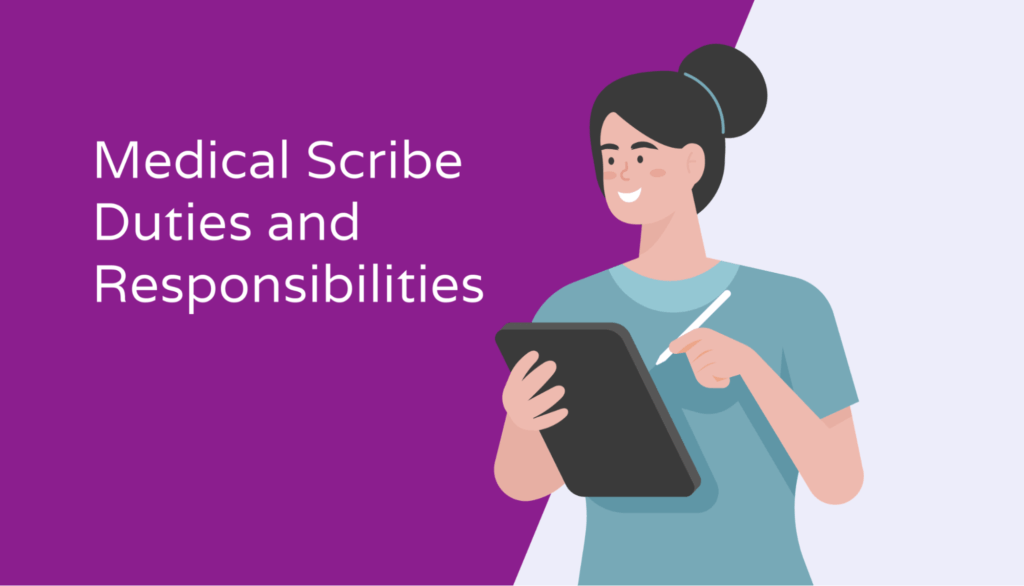With the increasing demand placed on physicians to meet high patient loads, many are finding it challenging to keep up with the documentation required for each visit. Maintaining patient charts, writing progress notes, and completing referrals are just some of the tasks that they need to complete on top of treating patients. In fact, a 2021 study found that healthcare workers’ stress levels are 25.8% higher than the general population’s.
Many doctors are turning to medical scribes to help with charting, documentation, and other clerical duties. This article will cover the facts on medical scribes, including common duties, skills and traits, salaries, and job demands.
What is a medical scribe?
A medical scribe is a professional trained to assist a physician with documentation, charting, and other administrative tasks. Some scribes work in real time during patient encounters to document the physician’s dictation into the patient’s electronic medical record (EMR).
Medical scribes are not new, but their services have been in high demand since the Affordable Care Act’s (ACA’s) implementation in 2010. The ACA emphasized providing quality patient care and documenting medical encounters in order to receive reimbursement from insurance companies. This led to an increase in the use of EMRs, which can be time-consuming for doctors and physician assistants to input data into.
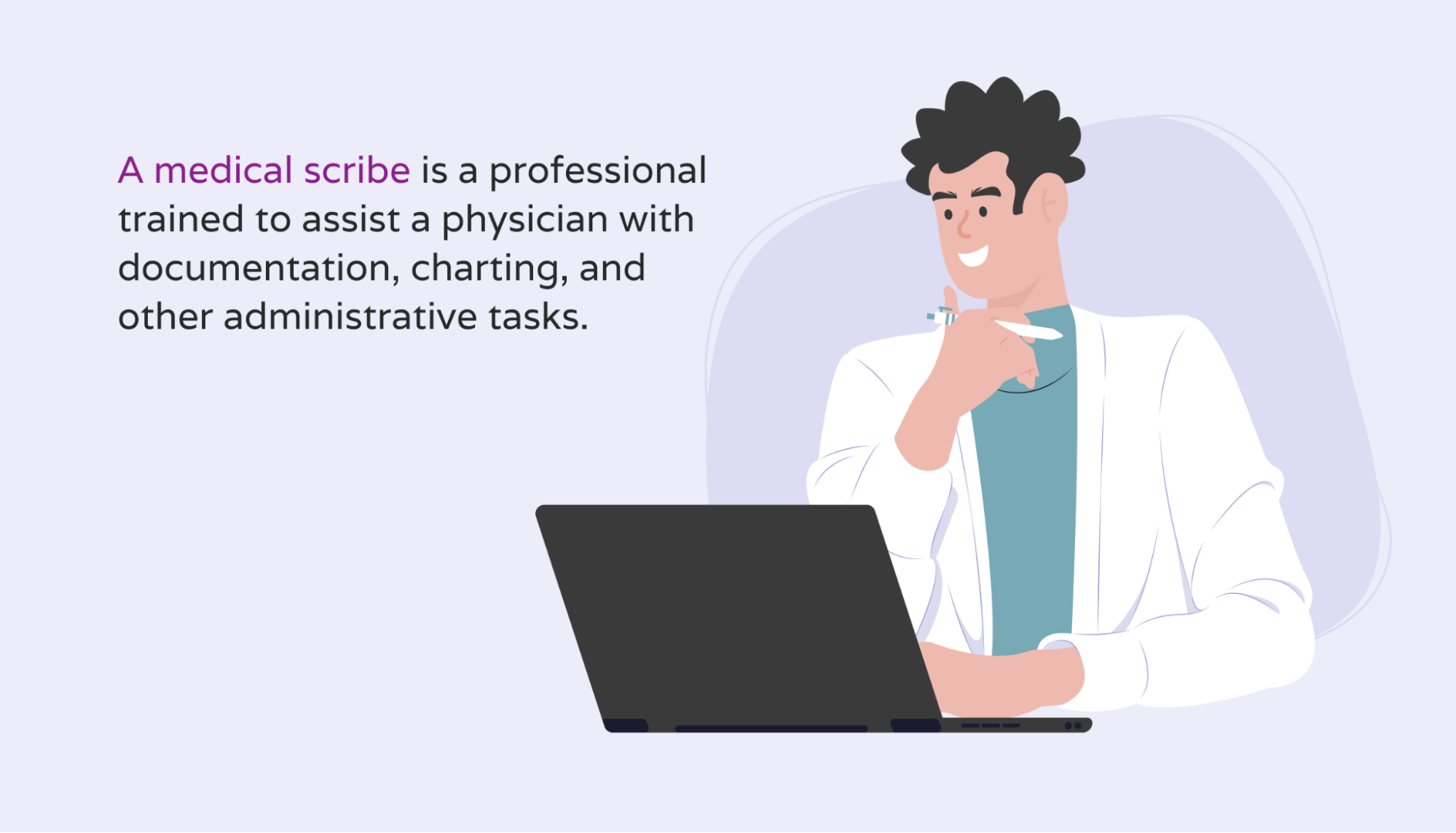
Healthcare Virtual Assistants and medical scribes can help alleviate this burden by remotely providing real-time documentation, charting, and administrative support. This allows physicians to focus on patient care and frees staff to complete other tasks.
Medical scribes can also improve the accuracy of medical documentation, as they are trained to document in a specific format that insurance companies and government regulations require. Ensuring that documentation is accurate and complete can help avoid delays in reimbursement and reduce the likelihood of denials happening.
If you want to learn more about Healthcare Virtual Assistants and how these professionals can help your clinical setting, read through Hello Rache’s How It Works guide.
Common duties of a medical scribe
Common medical scribe duties include the following.
Updating electronic health records
Scribes are responsible for updating patients’ EMRs with physicians’ dictations. This task includes progress notes, diagnostic tests, and communication during patient visits. Without a scribe, physicians typically input this data themselves, which can be time-consuming.
Clerical tasks
Scribes often handle various clerical tasks, such as scheduling appointments, making referrals, and ordering lab tests. Though they’re some of the most common functions in an outpatient setting, these tasks can be time-consuming and take away from direct patient care. Outsourcing clerical tasks to a scribe is one of the most efficient ways to manage time between patients.
Medical documentation
One of a scribe’s most important daily tasks is documenting the physician’s dictation in a patient’s EMR. Scribes are trained to document in a format that meets the requirements of insurance companies and government regulations. Ensuring that medical documentation is accurate and complete can help avoid delays in reimbursement and reduce the likelihood of denials.
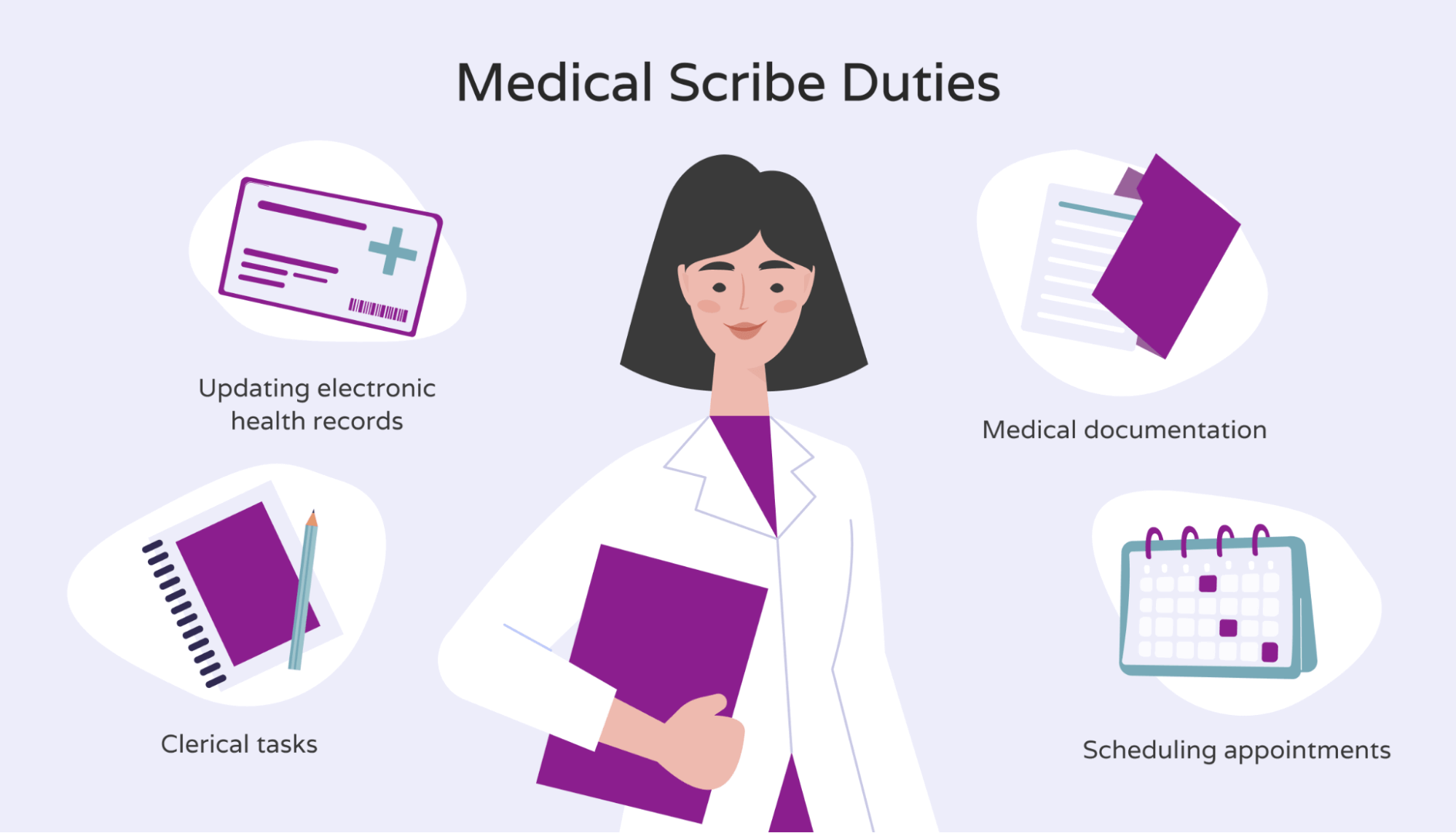
Obtaining lab reports
Scribes are often responsible for ordering and obtaining lab results from external facilities. This ensures that the physician has the most up-to-date information on patients’ conditions and can make informed treatment decisions.
Voice recordings
Scribes can also be responsible for recording a physician’s dictation of patient encounters. This is typically done using a digital recorder or software program that captures the audio of the encounter. The scribe then transcribes the recording into the patient’s EMR. Though not every medical practice uses this method, it can be helpful in situations where the physician’s dictation is unclear.
Answering patient questions
Scribes can also answer patient questions and provide general information about the practice. It can include questions about appointment scheduling, billing, and insurance coverage. Many scribes are also trained to provide basic medical information, such as what to expect during a procedure.
Nearly all scribe duties center on providing healthcare professionals support so that they can focus on direct patient care. This support includes tasks such as documenting encounters, ordering tests, and answering patient questions. Medical scribes play a crucial role in increasing the efficiency and quality of care in any clinical setting.
Medical scribe skills and traits
Working with a medical team in a physician’s office, urgent care center, or other outpatient healthcare facility requires specific skills and traits.
Here are some of the most crucial ones for medical scribes.
Verbal communication skills
Medical scribes need to be able to communicate effectively with patients, their families and friends, and other members of the healthcare team. This includes understanding and explaining complex medical information in layperson’s terms. Scribes also need to be able to take accurate and complete dictation from physicians.
Interpersonal skills
Medical scribes need to be able to establish rapport with patients and their families. They also need to work well with other healthcare team members, including physicians, nurses, and office staff.
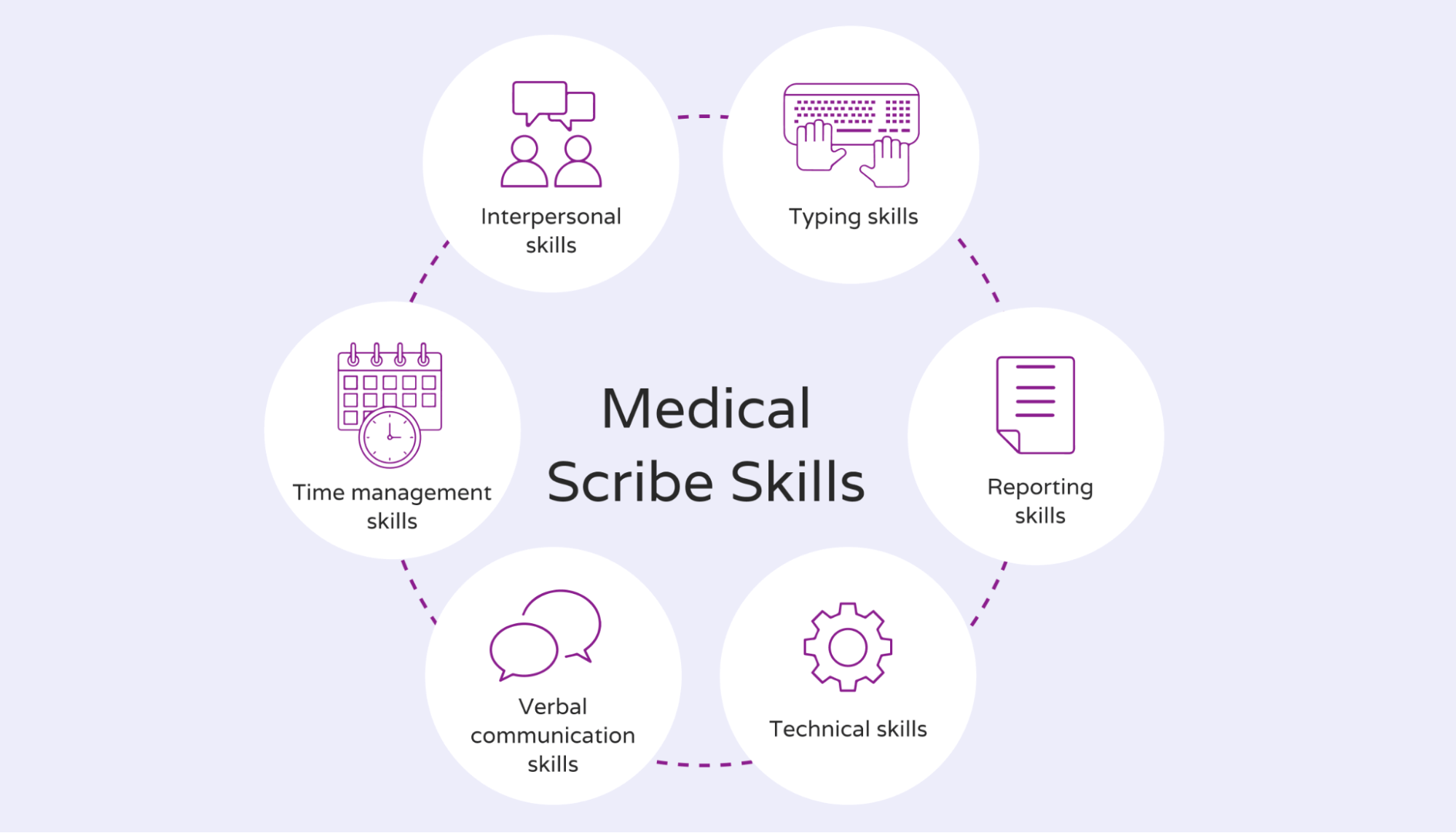
Reporting skills
Medical scribes are responsible for documenting physician dictation in the patient’s medical record. This requires strong reporting skills to ensure that all documentation is accurate and complete. Scribes also need to be able to generate reports on test results, office visits, and other aspects of patient care.
Technical skills
Medical scribes need to be proficient in the use of EMRs and other medical record software platforms. They must be able to understand and utilize different features of the EMR, such as ordering tests and documenting encounter notes. Furthermore, they need to be familiar with office equipment, such as printers and fax machines.
Time management skills
Medical scribes need to be able to manage their time effectively to ensure that they complete all their tasks in a timely manner. Good time management includes prioritizing tasks and multitasking. Scribes must also be able to work well under stress to meet strict deadlines. Medical offices can be fast-paced, so time management skills are essential.
Typing skills
Medical scribes need to have strong typing skills to accurately and quickly document physician dictation in a patient’s EMR. Scribes should also be proficient in using keyboard shortcuts to save time. The average non-crucial medical scribe types 40–45 words per minute.
These are just some of the important skills and traits for medical scribes. To succeed in this career, these professionals must have a strong foundation in medical knowledge and terminology and be able to communicate information to patients, families, and other healthcare team members. Your medical practice or facility can benefit from the services of a medical scribe.
Medical scribe salary and demand
The rising demand for medical scribes is driven by a number of factors, including the increasing use of electronic health records and the need for more efficient and accurate documentation of patient encounters.
The number of patients physicians and other medical professionals can see each day is limited, and these workers are often bogged down by paperwork, leaving less time for patient care. Medical scribes can play a key role in increasing a practice’s efficiency and level of care by taking on documentation and charting tasks.
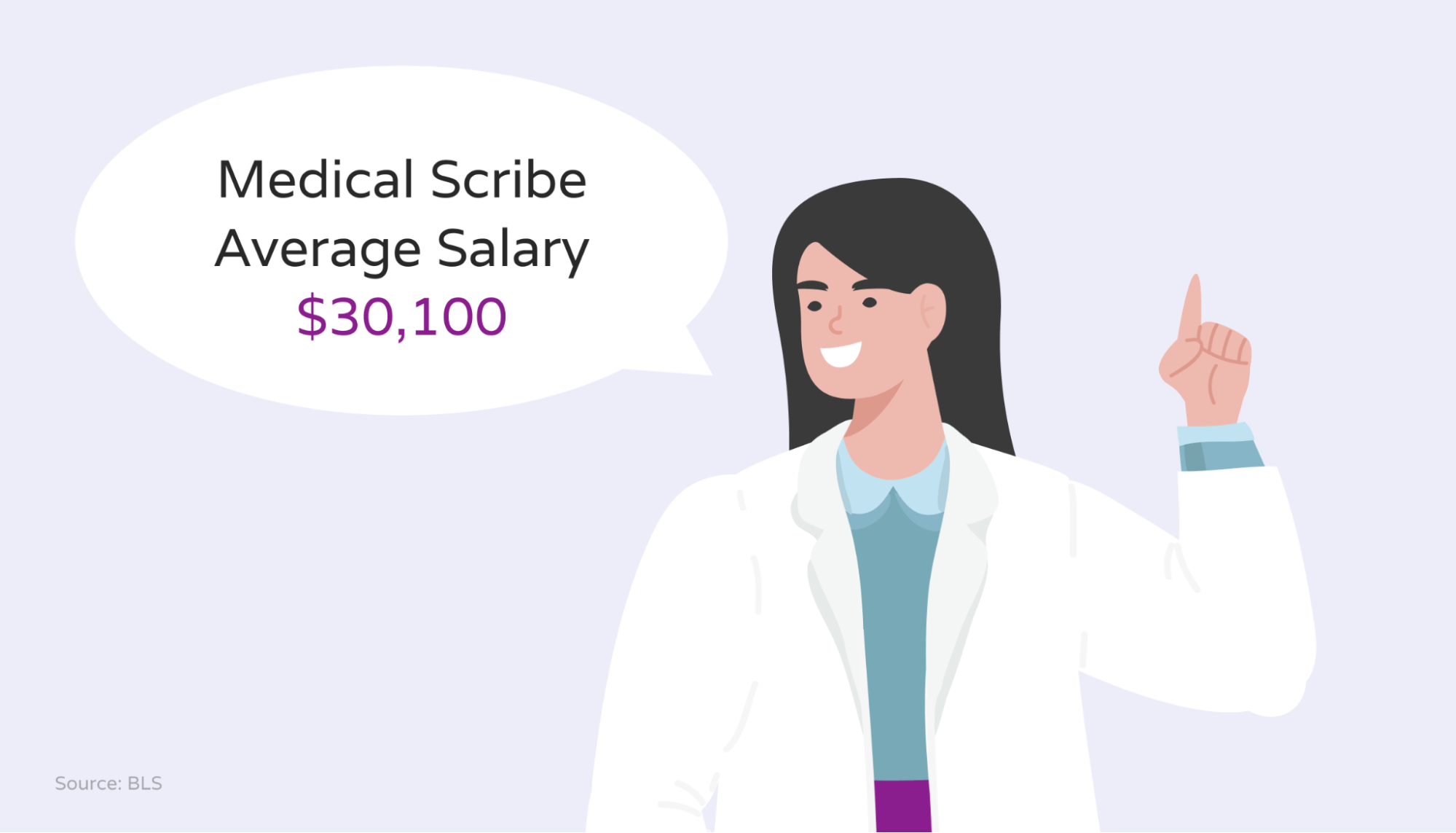
According to the BLS, the annual salary for a medical scribe is $30,100 — though this can vary depending on experience and location. The demand for medical scribes is expected to produce around 9,300 new openings each year through 2030, though this number could turn out to be higher as the healthcare industry continues to grow.
With the expected growth in the need for medical professionals in the coming years, those with skills and experience in medical documentation will be in high demand. If you’re interested in bringing on a medical scribe to help with documentation in your practice, be sure to consider your budget and your practice’s specific needs.
In addition to the demand for medical scribes, there is a need for medical billing and coding professionals. These individuals play a vital role in the healthcare industry by ensuring that claims are processed correctly and in a timely manner. Medical billing and coding professionals often work closely with insurance companies to ensure that patients receive the coverage they are entitled to. Some scribes may also have the skills and experience to complete medical billing and coding tasks.
Book a call with Hello Rache today to learn how your practice can save money with a virtual medical scribe.
Benefits of hiring a medical scribe
Hiring a medical scribe may be the answer for medical practices struggling with documentation. Medical scribes can take on the documentation burden so that physicians can focus on patient care. This can lead to a number of benefits for both the medical practice and its patients.
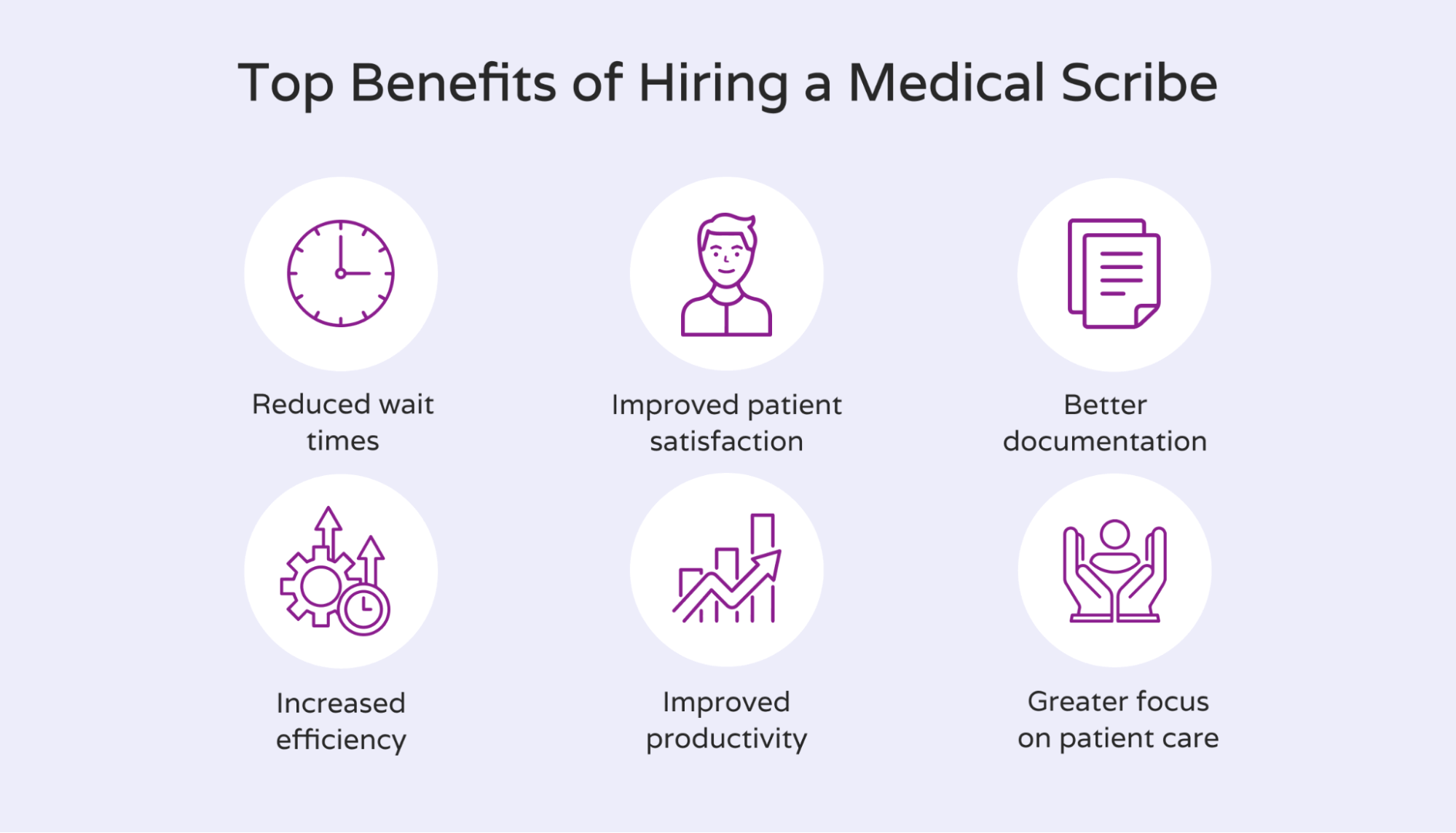
Some of the most prominent benefits include.
Reduced wait times
One of the biggest complaints patients have is that they have to wait a long time to see the doctor. A physician who’s bogged down with documentation can mean less time spent seeing patients. By having a medical scribe handle documentation, physicians can spend more time with their patients and gain a few extra minutes back in their day. This can lead to shorter wait times for patients, which in turn can alleviate some of the stress they might experience when going to the doctor.
Improved patient satisfaction
Patients are more likely to be satisfied with their overall experience when a medical scribe is involved. When physicians have time to spend with their patients, they can build stronger relationships with them and provide higher-quality care. This can lead to improved patient satisfaction and loyalty to the medical practice.
Better documentation
One of the main tasks of a medical scribe is to provide better documentation for patient encounters. This can include transcribing physician orders, taking notes on patient interactions, and documenting changes in condition. By having a dedicated person responsible for documentation, the quality of the documentation is likely to improve. This can be beneficial for both the medical practice and patients.
Greater focus on patient care
One of the main goals of hiring a medical scribe is to allow physicians to focus on patient care. A physician who isn’t burdened with documentation can spend more time talking to patients, answering their questions, and providing the compassionate care they need. Some people find visiting the doctor to be anxiety-inducing, but a medical scribe can help to make the experience more positive by allowing the physician to focus on the patient.
There are just a few of the many advantages associated with hiring a medical scribe. When you free up your physicians’ time, you improve the quality of care for your patients and make your practice run more smoothly overall.
Find a medical scribe for your practice
Hiring a medical scribe can be extremely beneficial for both the medical practice and patients. Scribes take on the documentation burden so that physicians can focus on patient care. This can lead to shorter wait times, improved patient satisfaction, and less stress for everyone involved.
With Hello Rache, finding the perfect scribe for your medical staff is easy. If you’re interested in hiring a medical scribe, contact Hello Rache directly to learn more about the process and how you can maximize a medical scribe’s benefits for your practice.

